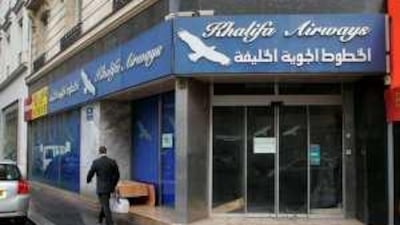RABAT // After going bankrupt, Omar Abed held out through the hot, humid Algerian summer before the heart attack finally struck. "I had just come home and said hello to my family when I felt my chest tighten," said Mr Abed, a merchant in the Algerian capital, Algiers. "Until then I hadn't told my wife that our money was in El Khalifa Bank."
Mr Abed was among the victims of Rafik Khalifa, an exiled former tycoon brought low by a banking scandal that cost hundreds of thousands of Algerians their savings and jobs. Once the glamorous star of Algeria's emergence from a decade of civil war in the 1990s, Khalifa has become a symbol of the widespread corruption that still plagues the country. This month authorities in Britain are set to decide on Khalifa's extradition to Algeria, a move his lawyer, Anna Rothwell, said he would appeal. For now, the spotlight is back on the man who conned a nation.
Khalifa's profile rose as Algeria's government subdued Islamist insurgents in the 1990s and liberalised its economy to make up for lost growth. Within a few years, he had used capital from his family-owned pharmacy to construct a vast business empire. Venturing abroad with European-based TV stations and the launch of Khalifa Airways, Khalifa took to courting the likes of Gérard Depardieu, Catherine Deneuve and Sting at his villa on the Mediterranean.
The cornerstone of his empire was El Khalifa Bank, which offered up to 17-per-cent interest to more than one million clients. That appealed both to many public companies and to Algerians like Mr Abed, the merchant, who put his money in El Khalifa Bank in 1998 in the hope of increasing it. But as Khalifa shot to fame and fortune, speculation grew that his success hinged on working political connections and dodging rules.
"If you look at Khalifa's vertiginous climb through Algeria's economy and society, it's clear he must have had some support," said Jon Marks, a North Africa analyst and the head of Cross-Border Information, a British risk-assessment firm. "Algerians started asking questions," said Faycal Metaoui, a political columnist for El Watan, an independent newspaper. "How did an unknown become so rich so quickly? Where did the money come from?"
Unknown to Algerians, funds were being illegally siphoned from El Khalifa Bank to fuel the runaway expansion of Khalifa's companies. In November 2002, suspicious Algerian regulators restricted the bank's money transfers. The next February, three Khalifa group businessmen were caught at Algiers' airport en route to Paris carrying suitcases stuffed with US$2.9 million (Dh10.7m). Within months, El Khalifa Bank had folded, 20,000 had lost their jobs and Khalifa had fled his Paris office for Britain, which then had no extradition treaty with Algeria. The two countries swiftly signed one, and Algeria launched an investigation that implicated high-ranking state officials. More than a dozen suspects were convicted in 2007, including Khalifa, who was sentenced in absentia to life imprisonment. He is currently held in London's Wandsworth Prison while Algeria's extradition request is considered.
The affair jolted Algerian authorities, who have since unleashed investigations into suspect businesses and government agencies, and abolished immunity for officials. Last October, the president called for the creation of a state corruption watchdog. "The government is now committed to a major, wide-ranging anti-corruption campaign," Mr Marks said. But observers "are looking to see whether there's concrete evidence the political-economic system has changed".
Algerians worry that despite the clampdown, big fish like Khalifa can still use political influence to slip through the net, Mr Metaoui said, noting that Algerian law calls for Khalifa to be retried if his extradition goes through. That fear is shared by Mr Abed, who recovered from his heart attack in 2003 to head the Collective of El Khalifa Bank Fraud Victims. He wants former officials at Algeria's central bank punished for what he calls their failure to police Khalifa.
Two key suspects convicted in the Khalifa affair, Abdelouahab Keramane, a former governor of the Bank of Algeria, and his brother Abdenour, a former industry minister, have fled abroad, claiming charges against them are politically motivated. The government insured El Khalifa Bank accounts by up to 600,000 Algerian dinars (Dh30,000), "but that's much less than what was lost", Mr Abed said. Meanwhile, authorities are thinking twice about the economic deregulation that opened the door to Khalifa. State banks and public investment have returned to dominance.
"The Algerian leadership can point to Khalifa as an example of the dangers of a free market," Mr Marks said. "But the market he represented was a peculiarly Algerian one, and had little to do with principles that conventional economists would recognise." jthorne@thenational.ae

